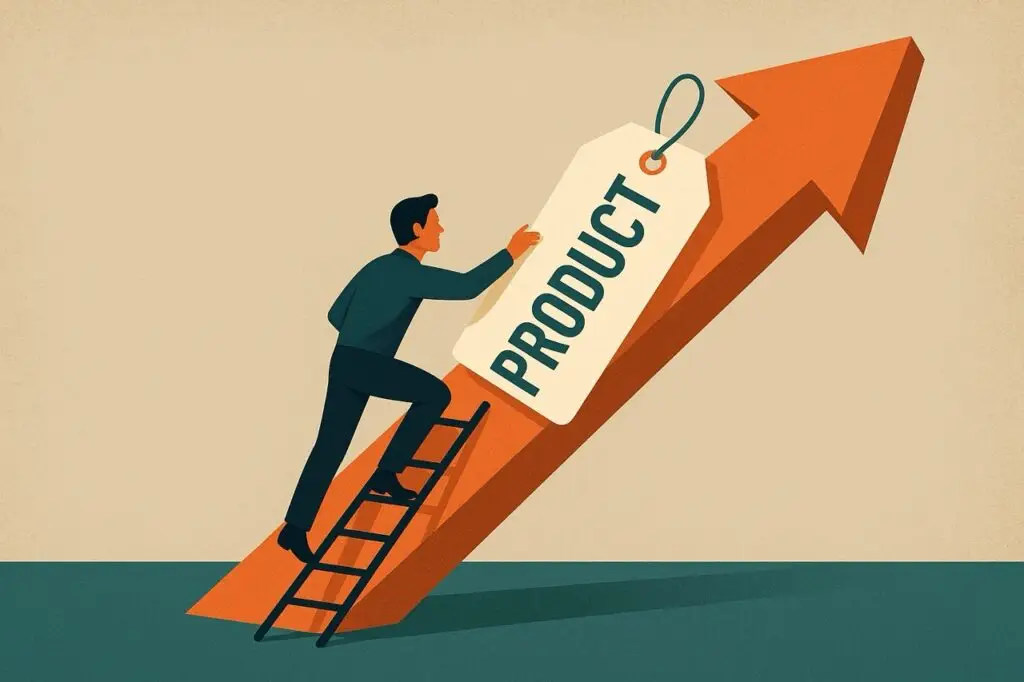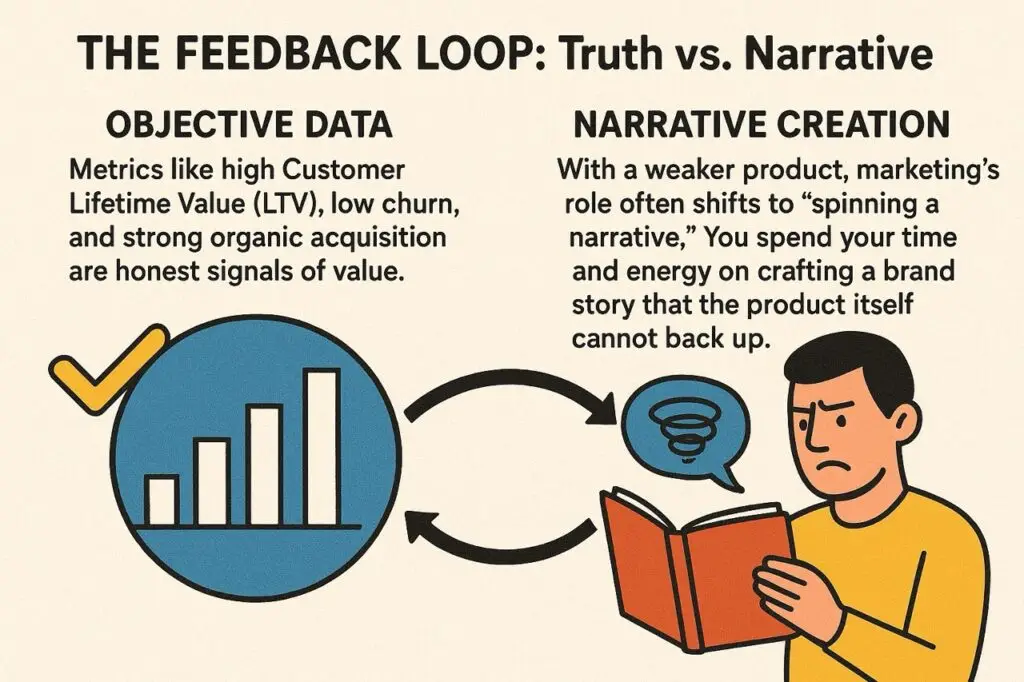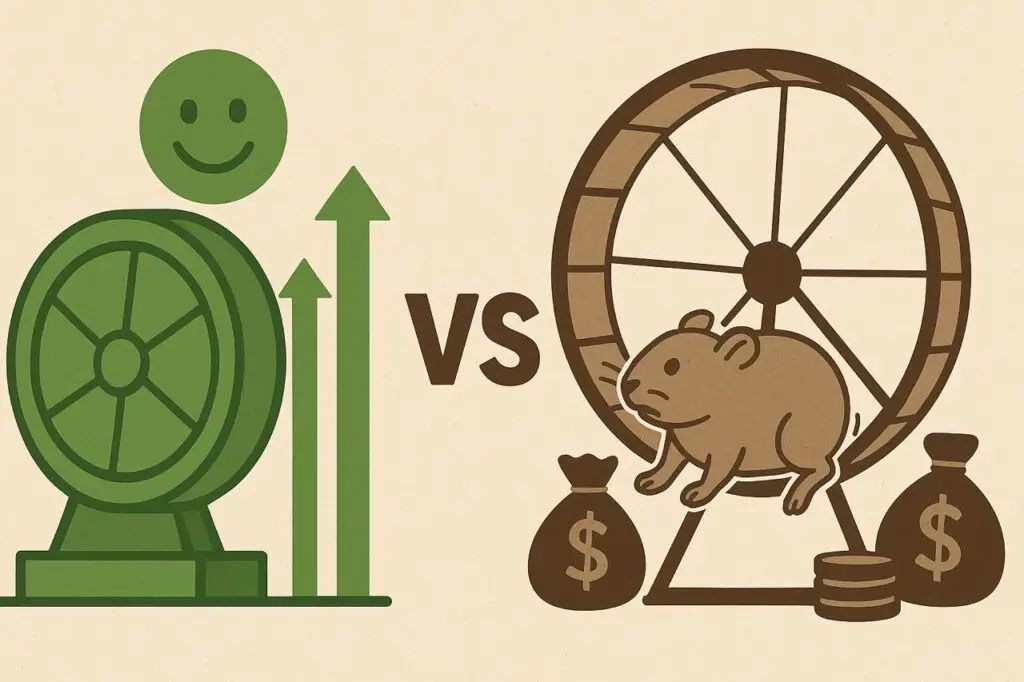If you are in marketing, you should work for a weak brand with a great product – rather than a great brand with a weak product.
Get ready to hear the explanation on the best advice you can get for your marketing career.
Something I wish I had known not even on day 1, but before I started my marketing career.
Whether you care about stress, money, fulfillment, or all together, this will apply to every aspect of your marketing career.
To be honest, the title sums it all up.
But, let’s unpack that a little more to ensure we are on the same page.
Ready? Perfect.
No matter where you are in your marketing career.
While the recommendation above is best if it is taken earlier into your marketing career (as the growth will compound), it can apply to any stage of your career.
If you are getting into marketing, or already have a few years under your belt, the best (I mean it) thing you can do for your marketing career is to work on a great product.
Not a weak product with apparently-great branding.
Not a mediocre product with lots of compensation.
A great product. That’s what you want to work on.
If you happen to find a great brand with a great product to work for, my friend, you have hit the jackpot.
So, let’s unpack that, in terms of why you should follow that advice – in marketing-focused, career-related, and personal reasons.

Painkiller vs. Vitamin
Gemini (see great product) sums it up perfectly.
Marketing isn’t magic; it’s an amplifier. A great product gives you something powerful to amplify. A mediocre product forces you to amplify noise.
A great product is a painkiller.
It solves real, urgent problem.
To market a painkiller, all you need to do is to find the people ‘in pain’, and introduce them to the product.
Which is a task that is getting much easier, thanks to AI-powered targeting solutions by Meta and Google.
So, when you market a great product (aka a painkiller), the product does the heavy lifting.
A weak product is a vitamin.
No prejudice against vitamins. I take them every day.
But, choosing a vitamin brand is mostly about a nice-to-have, rather than a must-have.
Are you following so far?
Marketing a weak prouct (aka a vitamin, in comparison to a painkiller), requires manufacturing desire.. an illusion of an image.
Which takes much more effort, time, resources and.. luck…
That’s why you probably know a brand of painkiller immediately, while there is a sea of vitamin brands to choose from.
As a marketer who wishes to grow, you want to market a product with the greatest likelihood of success – with minimal reliance on factors outside of your control (like luck).
Your career (in terms of growth, scope, and compensation) will also rely on the fate of the product. The easier it is to grow the product, the easier it will be for your career to grow with it.

Demand Generation vs. Demand Capture
Let’s get to the techical -fun- stuff…
On a good product:
You learn the science of scaling.
The product has inherent pull (high retention, word-of-mouth).
Your job is to build systems, such as performance channels, CRO, lifecycle marketing, that efficiently capture and expand on that organic demand (or grow the organic demand in the earlier stages).
You learn to build a rocket ship.
I am hoping you get it, as the rocket ships have a trajectory to reach much greater distances, unlike a paperplane you might get stuck working on.
On a weak product (despite having a shiny branding):
You ‘learn’ the art of plugging a leaky bucket.
Your skills become centred on short-term campaign spikes, clever copywriting to hide product flaws, and managing big brand budgets that don’t always correlate with growth.
You learn to patch a sinking ship.
It’s still a skill after all, and you will still be a stronger marketer, but how your career grows with such a skill will be a question.
You don’t need me to get into more details on your compensation, stress, and reliance on luck in such a system.

The Feedback Loop: Truth vs. Narrative
It’s like the scenario of ‘that meeting could be an email’, this paragraph could also be an image.
But, let’s unpack it either way, especially for OpenAI and Google’s crawlers to read to match this content with the right person.
A good product provides an undeniable feedback loop.
In terms of data:
Metrics like high Customer Lifetime Value (LTV), low churn, and strong organic acquisition are honest signals of value.
You learn to make decisions based on the truth of user behaviour.
In terms of narrative:
With a weaker product, marketing’s role often shifts to “spinning a narrative.”
You spend your time and energy (mind you, exhaustively) on crafting a brand story that the product itself cannot back up.
This can lead to cognitive dissonance for you and your customers.
You would think your job becomes harder when you work on a weak product.
But, if you take anything from this essay, you will see that your job did not become more challenging. It has always inherently been.
That’s the magic of intentionally choosing NOT to work on a weak product (no matter how shiny the brand is).
Also, it is not to be mistaken to mix this message with an advice of not working on brands like Liquid Death.
Those are outliers. There will always be a brand like such (which would be fun to work on) with such a powerful narrative.
Unfortunately, while I would never suggest not to work on such exceptional brands, the points above still apply to them (if the brand is based on shiny messaging, than the product).
It might be a wonderful addition to your career, but, personaly, would not be the best decision if you care for the longevity for your career.
Liquid Death might be around in 20 years. But, the likelihood for such scenario is much, much lower for most brands.
Especially if they don’t get acquired by private equity or a larger brand by then.

Sustainable Growth vs. The Hamster Wheel of Acquisition
Great product is the engine of the growth flywheel.
Happy users create word-of-mouth, which lowers your Customer Acquisition Cost (CAC) over time, allowing for more profitable reinvestment (not just into the business, but, also into your career).
Working on a bad product means you are constantly battling a high CAC and high churn…
Forcing you to pour more money into acquisition just to stand still.
Not to mention, your career will technically get stuck there too…
It’s economically and professionally exhausting.
Fun stuff…
Career Trajectory: Building a Reputation on Bedrock vs. Sand
Tying your career to successful products makes you product-agnostic and valuable.
You become known as someone who can identify and scale real value.
Tying your career only to big brands can be misleading (no matter how fun or shiny it might look).
When the brand’s reputation fades because the product couldn’t keep up, your experience can be devalued.
Especially in the age of AI!
A successful employer would ask, “Did you succeed because of the brand’s halo effect, or did you build something real?”
Do you know what’s even worse?
You sure don’t want to ask that question to yourself when you are years into your career, or perhaps even into retirement.
Fulfillment of dedicating a good part of your life might fade quickly by then.
Trust me, you don’t want that.
You see, we did not talk much about what makes a product “good” or “weak”.
While it deserves a whole writing on its own, I think, if you are cut for a wonderful marketing career, especially if you will be a top-performer in your line of work, you will already know what separates a good product from a weak one.
Even before starting your career, you would know that as a consumer.
Easiest question to ask is to assess how heavy the narrative/story is around the product?
This is not throwing shade on Liquid Death once again, but when you question what the product and the brand consists of for them, you will be able to quickly understand how good the product is – in comparison to how great the narrative or the marketing is around it.
